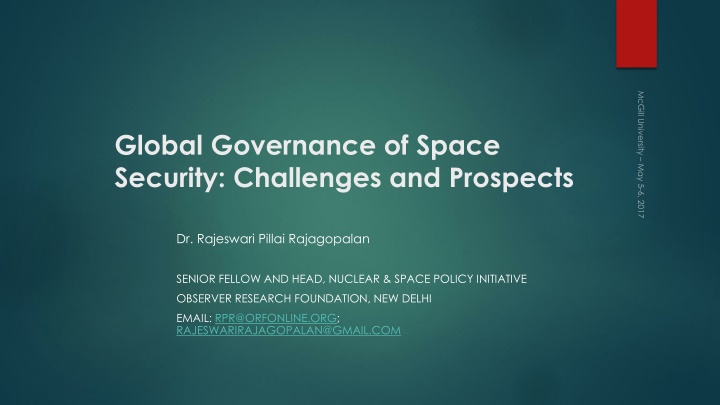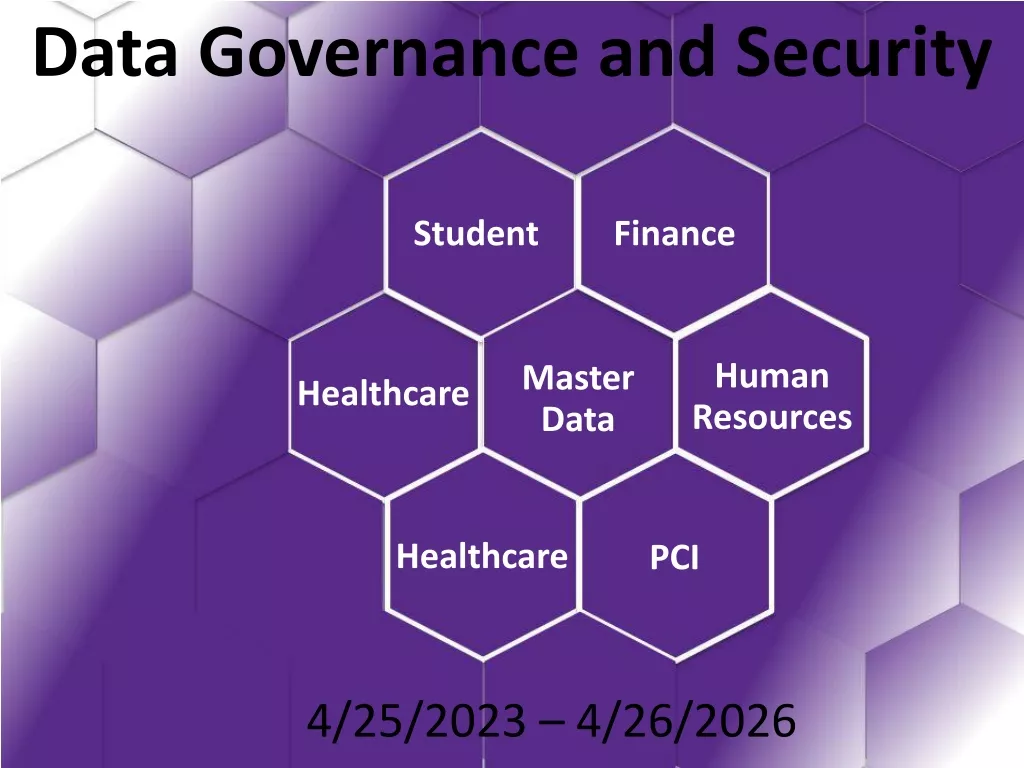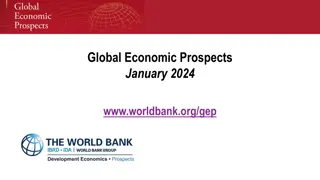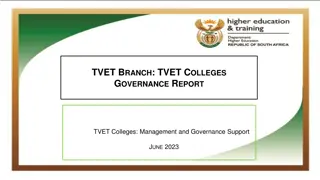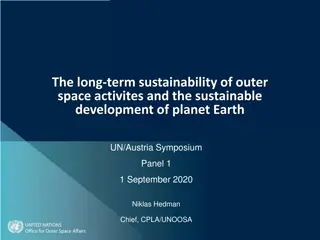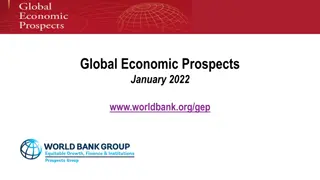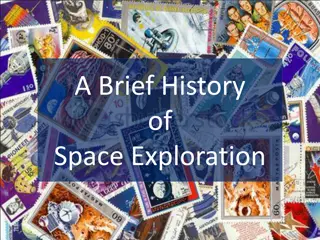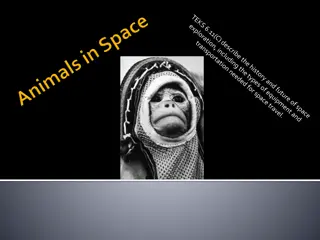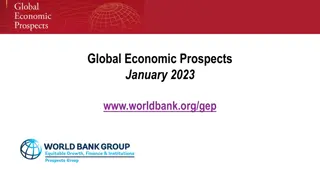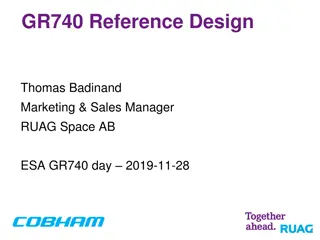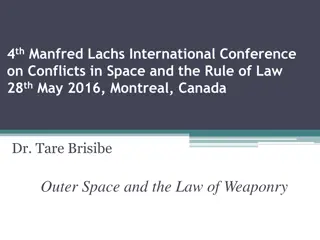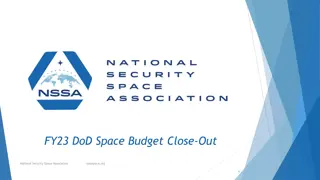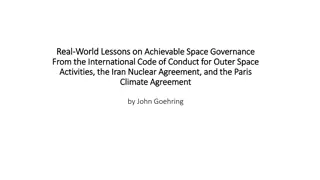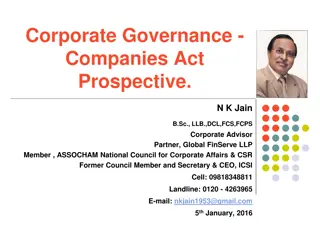Global Governance of Space Security: Challenges and Prospects
"Dr. Rajeswari Pillai Rajagopalan, Senior Fellow and Head of Nuclear & Space Policy Initiative at Observer Research Foundation, discusses the challenges and prospects of global governance in space security."
Download Presentation

Please find below an Image/Link to download the presentation.
The content on the website is provided AS IS for your information and personal use only. It may not be sold, licensed, or shared on other websites without obtaining consent from the author.If you encounter any issues during the download, it is possible that the publisher has removed the file from their server.
You are allowed to download the files provided on this website for personal or commercial use, subject to the condition that they are used lawfully. All files are the property of their respective owners.
The content on the website is provided AS IS for your information and personal use only. It may not be sold, licensed, or shared on other websites without obtaining consent from the author.
E N D
Presentation Transcript
Global Governance of Space Security: Challenges and Prospects Dr. Rajeswari Pillai Rajagopalan SENIOR FELLOW AND HEAD, NUCLEAR & SPACE POLICY INITIATIVE OBSERVER RESEARCH FOUNDATION, NEW DELHI EMAIL: RPR@ORFONLINE.ORG; RAJESWARIRAJAGOPALAN@GMAIL.COM
Space Security Background Considered threats of the future In reality, clear and present danger today No effective regime in place No guidelines and norms Urgent need to: Define and communicate clear boundaries of acceptable behaviour Develop norms of responsible behaviour While working for more binding mechanisms
Space Security Challenges Advanced military space programmes, including ASAT capabilities No weapons in outer space yet; ground-based assets significant threat Increasing space debris, risking civilian assets Larger than 10 cm more than 21,000; between 1 and 10 cm approx. 500,000; smaller than 1 cm exceeds 100 million Number and types of players gone up significantly Total no. of satellites: 1459 (until Dec 2016); US: 593; China: 192; Russia: 135 Proliferation of small satellites mini, micro and nano satellites Large number of state and non-state players; difficulty of detection of small sats Unregulated regional and international space cooperation Diverting capabilities for mil space prog; development of ballistic missiles State of the regime Lack of consensus among major powers
An Effective Outer Space Regime should Ensuring security of space Preventing danger or threat to outer space utility Ensuring order and stability Freedom of action in outer space no adverse effects Ensuring sustainability For peaceful purposes and ensuring outer space remains clean and sustainable Accepted by most states, at least in rhetoric State of the Int l Space Regime Lack of consensus among the major powers to deal with the challenges contributing to slow development of space norms
Several difficulties Changing balance of power equations Relative decline of the US Rise of the rest Increasing emphasis on hard power particularly in Asia Two opposing camps among major powers and crisis in decision-making hampered by political hindrances Technology proliferation No more controlled by two or three states Inherent interest to control technology So we need to work on what is feasible than what is desirable and ideal
Norms and TCBMs New rules of the road essential for safe and continued access to space Norms of responsible behaviour as the first step draw clear red lines and establish basic parameters of responsible behaviour in outer space No testing/ deployment of space weapons in outer space Non-interference with peaceful activities of other states Start with the least controversial and minimally acceptable set of measures (TCBMs, GGE, CoC) Gradual progress toward more binding, legal, verifiable instruments TCBMs good base for establishing greater trust between nations that might help in mitigating the political difficulties among states Pre-launch notifications and high-risk re-entry events Strengthen SSA cooperation Definitional clarity
Why Norms and TCBMs An intermediate step between a functional need and a binding instrument An early place to get all sides talking and build up confidence in each other and momentum Institutionalize best practices Can eventually lead to more binding measures No guarantee for responsible behaviour, international peer pressure to abide by commitments A risk-reduction measure, basis for greater understanding and dialogue among states, a pre-requisite for addressing political challenges
Why Code as A TCBM? Two key arguments: Why should states adopt and institutionalize code with no enforcement element? Does a code beef up state security in significant terms? These principles exist in various forms National policies; statements in Parliament; CBMs Codifying these principles in one instrument will bring greater cohesiveness Endorsement of such a document by a large number of states significant Pragmatically, a code could articulate Avoid activities that lead to further debris creation while developing new technologies and means in the area of Active Debris Removal and On-Orbit Satellite Servicing New area need to discuss how these might be employed Need to share broader space policies and strategies Regulate space collaboration among states; regimes need to spell out rules of the game Benefits regional and international security
We need to Strengthen SSA capabilities Strengthen efforts at developing norms of responsible behaviour Better space traffic management regulations Efforts to stem weaponisation trends Accelerate efforts on global governance
Concluding Thoughts Time for concerted action because: Truly global commons; one state s action can affect a large number of states Debris does not make a differentiation between different space objects Space a limited commodity - measures to strengthen sustainable use be pursued Cross-domain nature of space and cyber states need to invest in regional and global efforts to understand these environments on a real-time basis Move past political differences to develop a space regime (TCBMs, GGE, CoC) Inclusive process to bring all the different stakeholders to talk to each other Developed through an inclusive process ensure greater acceptability and compliance, contribute to the longevity of instruments National and global levels - Ensure participation of the new and upcoming
